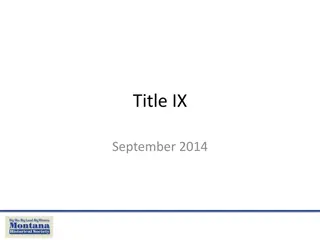Understanding Sports Psychology and Psychological Testing in Psychology
Exploring the realms of sports psychology, psychological testing, pioneers of psychology, and methods of psychology. Delve into the study of the mind, behavior, consciousness, soul, and the various types of psychological tests.
Download Presentation

Please find below an Image/Link to download the presentation.
The content on the website is provided AS IS for your information and personal use only. It may not be sold, licensed, or shared on other websites without obtaining consent from the author. Download presentation by click this link. If you encounter any issues during the download, it is possible that the publisher has removed the file from their server.
E N D
Presentation Transcript
Sports Psychology /Psychological Test Dr.Priti Pandey Associate Prof. Physical Education S.N.Sen B.V.P.G.College,Kanpur.
Phycho +logus A Study of soul . A study of Mind A Study of Counciousness A Study of Behaviour
PIONEERS of Psychology The early pioneers of psychology established it as a new and independent science. Wundt, Freud, Titchener, Wertheimer, Skinner, James and Watson proposed four seminal schools of thought, encompassing both experiments in laboratory and field, and also the development of clinical therapies. 1921 APA President. Margaret Floy Washburn was the first woman to earn a doctoral degree in American psychology (1894) and the second woman, after Mary Whiton Calkins, to serve as APA President. Ironically, Calkins earned her doctorate at Harvard in 1894
Sports Psychology Triplett broke some ground, but Coleman Griffith is considered the founder of sport psychology, as the first researcher to specialize in the area. He taught a course called Psychology and Athletics, and in 1925, opened the first research lab specializing in sport psychology topics
Psychological Test Psychological Test Psychological testing is the administration of psychological tests, which are designed to be "an objective and standardized measure of a sample of behavior". The term sample of behavior refers to an individual's performance on tasks that have usually been prescribed beforehand. , . ' ' , .
Methods of Psychology 1.Introspection 2.Observation 3.Experimental Method 4.Clinical Method 5.Developmental Method (Genetic) 6.Rating Scale and Questionnaire 7.Testing Method
There are nine There are nine types of psychological tests types of psychological tests Intelligence tests. Personality tests. Attitude tests. Achievement tests. Aptitude tests. Neuropsychological tests. Vocational tests. Direct observation tests.
Properties of a Good Psychological Test. Three important properties of any good psychological test are validity, reliability, and (where appropriate) standardization. ? : . : . : , . : . : - .
IQ TEST The most common types of IQ tests are: Stanford-Binet Intelligence Scale. Universal Nonverbal Intelligence. Differential Ability Scales. Peabody Individual Achievement Test. Wechsler Individual Achievement Test. Wechsler Adult Intelligence Scale. Woodcock Johnson III Tests of Cognitive Disabilitie
Personality tests Personality tests are techniques designed to measure one's personality. They are used to diagnose psychological problems as well as to screen candidates for college and employment. There are two types of personality tests: self-report inventories and projective tests.
Types of Personality Test 16 PF In his explorations of personality, British psychologist Raymond Cattell found that variations in human personality could be best explained by a model that has sixteen variables (personality traits), using a statisical procedure known as factor analysis. Eysenck's Personality Inventory (EPI) (Extroversion/Introversion) ... The traits measured are Extraversion-Introversion and Neuroticism. When you fill out Eysenck's Personality Inventory (EPI) you get three scores. The 'lie score' is out of 9. It measures how socially desirable you are trying to be in your answers.
The Jung personality test Jung personality test AND The Rorschach inkblot test inkblot test Rorschach measures your preferences for dealing with and relating to people, processing information, making decisions and organizing your life. ... The Jung typology is the result of the work of Carl Gustav Jung, an eminent Swiss psychiatrist who originated Jungian Psychology.(introvert,extrovert thinking/ feeling) The Rorschach inkblot test is a psychological test in which subjects' perceptions of inkblots are recorded and then analyzed using psychological interpretation, complex algorithms, or both. Some psychologists use this test to examine a person's personality characteristics and emotional functioning. The Rorschach Inkblot Test is a projective psychological test consisting of 10 inkblots printed on cards (five in black and white, five in color) created in 1921 with the publication of Psychodiagnostik by Hermann Rorschach. During the 1940s and 1950s, the test was synonymous with clinical psychology.
Attitude test Attitude test Attitude test assess an individual's feelings about an event, person, or object. Attitude scales are used in marketing to determine individual (and group) preferences for brands, or items. Typically attitude tests use either a Thurstone scale, or Likert Scale to measure specific items. Likert scale 5 point test and 6 point test((1) Strongly disagree; (2) Disagree; (3) Neither agree nor disagree; (4) Agree; (5) Strongly agree.) Extremely satisfied Very satisfied, Somewhat satisfied, Somewhat dissatisfied, Very dissatisfied and Extremely dissatisfied. Attitude measurement can be divided into two basic categories Direct Measurement (likert scale and semantic differential) Indirect Measurement (projective techniques and the implicit association test)
Thurstone scale Thurstone scale In psychology and sociology, the Thurstone scale was the first formal technique to measure an attitude. It was developed by Louis Leon Thurstone in 1928, as a means of measuring attitudes towards religion. ... People check each of the statements to which they agree, and a mean score is computed, indicating their attitude.
ACHIEVEMENT TEST Achievement test may be of different types on the basis of the purpose for which it is administered. They are diagnostic tests, prognostic test, accuracy test, power test, spit test etc. Achievement tests can be administered in different period of time. An achievement test is a standardized test that is designed to measure an individual's level of knowledge in a particular area. Spelling tests, timed arithmetic tests, and map quizzes are all examples of achievement tests. Each measures how well students can demonstrate their knowledge of a particular academic subject or skill. Achievement tests on a small scale like these are administered frequently in schools.
APTITUDE TEST aptitude test is an exam used to determine an individual's propensity to succeed in a given activity. Aptitude tests assume that individuals have inherent strengths and weaknesses, and have a natural inclination toward success or failure in specific areas based on their innate characteristics.
Neuropsychological test Neuropsychological test Neuropsychological test. Neuropsychological tests are specifically designed tasks used to measure a psychological function known to be linked to a particular brain structure or pathway. Tests are used for research into brain function and in a clinical setting for the diagnosis of deficits. Neuropsychological tests may help your doctor figure out the cause. ... Neuropsychology looks at how the health of your brain affects your thinking skills and ... Here are some examples of the kinds of tests
VOCATIONAL TEST Vocational tests, also referred to as career tests or occupational tests, are used to measure your interests, values, strengths and weaknesses. This information is then used to determine which careers or occupational settings you are most suitable for
OBSERVATION TEST Observation (Direct) Tests: Primarily used for research work, direct observation tests allow for observing the behavior of the respondent as he/she completes certain tasks and activities. direct observation. a method of collecting data in which a researcher simply views or listens to the subjects of the research, without asking specific questions or manipulating any variables. The method of direct observation is useful in evaluation research or field research. See also naturalistic observation.
BE POSSITIVE. AND KEEP READING .























